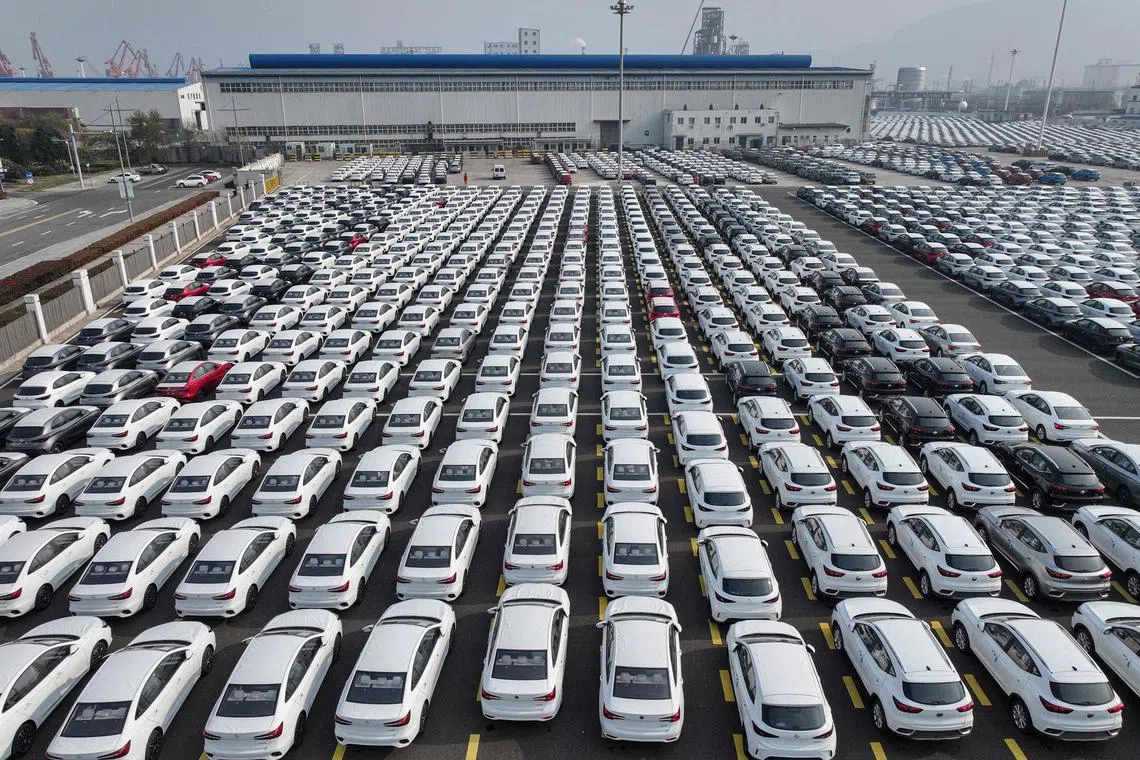How China became world’s largest car exporter
Sign up now: Get ST's newsletters delivered to your inbox

China’s home market for car sales is the world’s largest – almost as big as the US and European markets combined.
PHOTO: AFP
New York – Just two decades ago, China had little capacity to make cars, and owning one was considered novel. Today, it produces and exports more cars than any other country in the world.
US President-elect Donald Trump has promised to impose new tariffs on China.
China’s home market for car sales is the world’s largest – almost as big as the US and European markets combined.
As China’s domestic market grew, so did its production capacity, propelled by massive government investment and world-beating advances in automation. Yet in recent years, the pace of sales has fallen behind as consumer spending slows in the nation’s economic downturn.
The result is that China today has the capacity to make nearly twice as many cars as its consumers need.
To deal with the excess, it has increasingly looked overseas to sell cars.
China is a leader in the transition to EVs and it exports more of them than any other country. Chinese brands such as BYD are becoming known worldwide for offering advanced electric cars at the most competitive prices.
And as Chinese drivers have shifted rapidly to EVs, demand for petrol-powered cars in China has plunged and many are being exported instead.
But China’s trading partners say its exports of both electric and petrol-powered cars imperil millions of jobs and threaten major companies. Earlier in 2024, the US and the European Union put significant new tariffs on electric cars from China. Governments are concerned because the auto industry plays a big role in national security, producing tanks, armoured personnel carriers, freight trucks and other vehicles.
What’s more, China has used steep tariffs and other taxes as a barrier to car imports, so that practically all the cars sold domestically are made in China.
The country has invested heavily for more than 15 years in developing electric cars, to limit its dependence on imported oil. Mr Wen Jiabao, China’s premier from 2003 to 2013, made electric cars one of his highest priorities.
In 2007, he reached outside the Communist Party of China to choose Mr Wan Gang, a Shanghai-born former Audi engineer in Germany, as the country’s minister of science and technology.
Mr Wen gave him essentially a blank cheque to make China the world’s leader in electric cars.
Now, half of China’s car buyers choose battery electric or plug-in hybrid options. Until recently, buyers of electric cars also received large subsidies from the government. Carmakers have received low-interest-rate loans from state-controlled banks to build dozens of factories, as well as government tax breaks and cheap land and electricity.
By one estimate, Beijing’s assistance to China’s electric car and battery sectors has been worth more than US$230 billion (S$308 billion) since 2009 – one reason that the EU has imposed anti-subsidy tariffs.
China is projected to continue its heavy investment and retain its lead in EVs.
As a result, some assembly plants have been mothballed or shuttered. But carmakers, reluctant to close facilities, are selling many petrol-burning cars overseas at steep discounts.
Will tariffs slow China down?
The flood of Chinese cars into the global market has raised alarm. Governments have levied extra tariffs on electric cars from China, on top of baseline taxes already applied to all imported vehicles.
The tariffs come in different forms. The US levied a flat tax. The EU calculated a rate for each automaker based on the subsidies it received from Chinese government agencies and state-controlled banks. India and Brazil are also aiming to protect local industries.
But tariffs may not fully offset Chinese carmakers’ competitive lead. They offer cars with similar quality to their global rivals and at lower cost. Analysts at bank UBS calculate that cars made by BYD cost 30 per cent less to assemble than similar cars made by Western companies.
Some of the biggest savings for Chinese companies are in batteries. China controls practically the entire supply chain for making electric car batteries.
With the advantages China wields in making cars, the world’s intensifying pushback is unlikely to stop the country from dominating the industry for years to come. NYTIMES


